- Home
- Richard Matheson
The Link Page 15
The Link Read online
Page 15
En route to the house, John asks him seriously why he is “going back to all that old stuff’ after avoiding it all his life.
“I’m not exactly—” Robert starts.
“Get away from it, Bobby,” John cuts in. “It’s deep-end city, nothing more. You want to go off the edge like Ruth and Mom and the others?”
Robert doesn’t answer. John hasn’t left much room for him to do so.
They arrive at the house and the Vietnamese couple comes out onto the front porch.
A new development. Last night, the wife saw a “white mist” rising from the floor of their bedroom. She is convinced that there is “something” dead down there.
John tries to argue her out of it. He had the entire area beneath the house fumigated, cleaned and covered with fresh sand before the couple moved in.
The woman becomes agitated when her husband translates. “No!” she insists in her language. “There is something dead down there! Very big! Mouth wide open! Many, many teeth!”
John and Robert wince and exchange a look when her description is translated. “Oh,” says John uncertainly.
They unlock the small door under the porch which opens on the area beneath the house and crawl inside, each with a flashlight. John sniffs exaggeratedly.
“I don’t smell anything,” he says.
The underpart of the house is divided into sections by low walls to which thick supporting beams are fixed. They crawl across the first sandy section and shine their lights over the first wall they reach.
“Nothing,” John says.
They begin to crack jokes as they crawl, the situation striking both of them as pretty funny now. Robert keeps shushing John. The woman will hear and think they’re making fun of her.
“Well, we are,” says John, cackling. “This is stupid. Mouth wide open. Many, many teeth.”
They bump their heads and crawl on, chortling, cross the second wall. John makes spooky noises as they continue. “You’ll have to write a book about this,” he says. “Bay City Spooks I have Met and Loved.”
He puts his hand across the final wall.
And freezes.
“Bobby,” he says in a tight little voice.
Robert doesn’t hear, separated from his brother by several yards.
“Bobby,” says John, a little louder.
Robert hears the strained sound in his brother’s voice and crawls over, shines his flashlight beam down at where his brother’s hand has come to rest on the other side of the wall.
Both of them yowl and lurch back, landing in clumsy heaps on the sand.
They take another—timorous—look, then start to laugh with reacting abandon despite the grotesque sight.
The skeleton of an enormous cat lying on its back, it’s mouth wide open, all its teeth bared.
“The damn thing must have gotten in without anyone noticing before they locked the door after they finished cleaning,” John says, his voice a bit unsteady.
“Aye, that’s what they’d like us to think,” Robert intones in a sepulchral voice.
John throws sand at him.
They get a garden trash bag from the couple and force themselves to put the skeleton inside it. “Jeez, it’s moving!” Robert gasps.
“Now cut that out!” says John, hitting him on the arm.
As they carry the bag to the car, the Vietnamese woman stands on the front porch, smiling and nodding. “White mist, huh?” says John.
They drive to the dump, thoroughly spooked as the body in the trunk keeps sliding back and forth. “It’s trying to get out!” cries John.
Their uncontrolled laughter fills the car.
The convention; Cathy speaking.
“If you ask a psychic to tell you the serial number engraved on the inside of your watch and he or she gives you six correct digits in their proper order, do you conclude that he or she is psychic or that it was just his or her lucky day?
“Unhappily, the latter conclusion still fits closely into the scientific view of psi today.
“Why this enormous resistance to accepting psi? Paradoxically, the greater the data gathered by parapsychologists, the greater the proclamations of disbelief and accusations of conscious or unconscious fraud.
“Why does the psychic researcher have to jump more hurdles than researchers in any other field?
“Why do the critics of our work not admit that we are the ones with the greatest motivation to gather our data under strictly controlled conditions? We are not investigating psi to waste our time any more than the most hardheaded physicist or chemist in their field.
“There now exists a mass of experimental findings which can no longer be explained away as artifacts, statistical errors or the results of an international conspiracy of fraud and collusion.
“The paranormal tells us that we do not live in an ordered, logically structured world bounded by space and time. Instead, non-rational processes occur which transcend space and sidestep time. In such a world, the laws are no longer plain to see. We have nothing to relate to, no sure means of finding our place in the universal scheme of things.
“Such a realization can be, at the least, unsettling. So it is not surprising that many people, if brought face to face with such a possibility, reject any evidence supporting it in order to protect the integrity of their personality. Acceptance of the paranormal, to these people, may easily be seen as opening the door to insanity.”
Peter leans over to Robert. “Think she means Westheimer?” he whispers.
Robert is telling Peter the story of his brother’s “haunted” house when Cathy and Harry enter the hotel coffee shop. Peter, naturally, invites them to share their booth.
Robert congratulates Cathy on her speech, managing to retain his smile when Harry gives her a hug and tells her how proud of her he was.
Robert, at Peter’s urging, continues the story about the house and Cathy gives her opinion that the woman was psychic enough to sense the presence of the cat’s remains and hallucinate it into a white mist.
“Sounds simple,” Robert says.
“In a way it is,” she answers. “Although—”
“Why not just the cat’s ghost?” Peter suggests. “Wouldn’t that be even more simple?”
Cathy shrugs, smiling.
“Cathy tells me you’re psychic,” Harry says to Robert.
Robert smiles politely. “There’s some sign of it,” he says. CAMERA STARTS MOVING IN ON him.
“Did it just begin?” asks Harry.
“More or less,” Robert nods. He is in CLOSE-UP now.
“You don’t remember having it when you were younger?”
PICTURE FREEZES, Harry’s question repeated. “You don’t remember having it when you were younger?”
CUT TO Vietnam, 1968. A 25-year-old Robert on patrol with his squad.
They pass through a village, by a hut. In front of it, a Vietnamese woman is preparing food.
As they move away from the hut, Robert suddenly sees the ground fade away, sees a tunnel underneath them, filled with soldiers.
“Cong!” he yells and rushes into the underbrush, diving for cover just before Viet Cong soldiers come pouring from the hut, raking the squad with fire and throwing grenades.
Robert is knocked unconscious by an explosion, the left side of his upper back torn open by shrapnel.
Back to the coffee shop. “What?” he asks.
“You looked so far away,” says Cathy.
He makes a faint sound of amusement. “I was,” he says.
He returns to his room and lies down, trying to recapture the incident. He can recall no more; the ambush, unconsciousness. Then he remembers waking in the hospital.
The telephone rings. He picks up the receiver. “Rob?” she says.
He draws in breath. “Yes?”
“Are you all right?”
“Is that a joke?” he asks, meaning his name.
“You looked so strange down there.”
He explains what happened and she und
erstands; he’s starting to “open up”.
A pause. Then she says, “I’m sorry about this.”
“Well—” he doesn’t know what to say. “I guess it’s something you have to decide—oh, hell, Cathy, come here, Room 1123.”
“Rob.”
“Just so I can hold you for a minute, that’s all. Please.”
Silence. Then she hangs up. He rolls onto his side with a groan.
A few minutes later, there is a soft knock on the door. He looks at it incredulously, then leaps to his feet.
Seeing her, he pulls her into the room and kicks the door shut. Their kiss and embrace is fiery. They almost make love on the spot.
“Oh, no, please, no,” she pleads. “I love you but I can’t—”
“Can’t what?” he asks, almost angrily.
She pulls herself free and moves to the window, trembling. “Rob, I’ve known this man for sixteen years, been married to him for nine. He’s a sweet, kind man. I just can’t…”
“Cathy, you have to decide,” he tells her.
He stands motionless for a few moments before walking over to her and putting his arms around her from behind. She leans back against him.
“All right, I know it’s easy for me,” he says. “I don’t have to hurt anyone by loving you but… God, if you love me, Cathy.”
“I love you with all my heart.” She turns and holds him fiercely as they kiss. “With all my heart, Rob.”
A montage of the multi-textured convention. Displays and demonstrations. Discussion groups. Press interviews. Television camera crews. Fragments heard of speeches.
“The majority of scientists are imprisoned in a belief system which maintains that man is little more than a vastly complicated computer which is the chance outcome of cosmic chemistry followed by neo-Darwinian evolution. This belief system cannot possibly accommodate experiences of the kind called extra-sensory.”
CUT.
“The time has come to re-examine the difficult question of the nature of consciousness. The generally accepted scientific paradigm—that consciousness is identical with the physical description of brain states—is no longer acceptable.”
CUT.
“Psychical research, in the next few decades, is destined to have a social impact comparable to the impact, several centuries ago, of the astronomical investigations of Galileo and Copernicus.”
CUT.
Peter speaking, saying, “In spite of all objections, psi is gaining ground as a respectable branch of science. In 1969, the Parapsychological Association was accepted as an affiliate member of the American Association for the Advancement of Science.
“A questionnaire issued by the British magazine New Scientist revealed that more than two-thirds of those who replied believe that the existence of psi faculties has been established.
“Thousands of experiments in the last half century have confirmed that psychic talents exist, not just in a few rare and gifted individuals but in many people, indeed, perhaps, in everyone.
“The questions now being asked are ‘How can these talents be fitted into the framework of post-Einsteinian physics?’ and ‘Does man possess an aspect of himself capable of existing independently of his body?’
“The more we learn about our psi abilities, the closer we draw to a world of primal reality from which every one of us may well have originated.”
Peter and Robert are listening to a round table discussion when the phone call comes for Peter and he leaves the room.
The discussion is intriguing in that its participants are all successful business executives who have used ESP in their work.
“I think you’ll find,” says one of them, “that the higher on the executive ladder one climbs, the more ones decisions have to do with the unknown, the future. An ability to ‘sense’ what’s coming up in absolutely crucial.”
An electronic executive, founder of a major electronics corporation (in real life, Ampex) comments that he always follows “hunches”. “For instance, five top consultants told me that magnetic recording had no future. I knew deep inside myself that it did and went against their advice.”
The president of a coal company in West Virginia describes how he used ESP to find distant coal fields. “Listen, I don’t have to hear some cockamamie speech about whether ESP is valid or not,” he says. “Hell, I use it every day! It works for me! You think some tight-ass scientist telling me it’s not valid is going to make a bit of difference to me?”
Laughter.
A former member of the Federal Reserve Board says, “I conduct my business using ESP. I’ve dreamed things that have come true. Let me tell you, it’s the low-level boys who are afraid to admit using their ‘feelings’ even if they do. Every top executive I ever met has no hesitation admitting it.”
An engineer—the owner of a broadcasting company and a big-league baseball team—says, “Engineers have an easier time with psi because they’re accustomed to thinking in terms of frequencies and channels, radiation, transmission of energy force.”
A successful business advisor estimates that, in his work, ten per cent of his counsel is based on logic, ten per cent on experience. “The remaining eighty per cent, I guarantee you,” he says, “is strictly intuition.”
Peter returns, looking grave. Carol is ill, he has to fly home immediately. Robert will have to handle the Tahoe house alone. Cathy and Harry are flying back to New York on the 1st.
The look on Robert’s face reveals that Cathy hasn’t told him.
New Year’s Eve. Robert alone in his room. A call from Harry. Has he any plans? No, says Robert. “Do join us then,” says Harry. They are going to a midnight show at the Hotel Fremont—a well-known female singer.
Robert hesitates, imagining the agony of being with Cathy on the last night, her with Harry. But Harry is so cordially insistent that “both he and Cathy” want him along, that he “not be alone” that night that he accepts. He is sorry he did a moment after hanging up. “Damn!” he says.
The late dinner at the Fremont is an awkward experience for him. He does his best to be pleasant but Cathy, at least, knows what’s happening inside him.
When Harry goes to the men’s room, she tells Robert that it wasn’t her idea, that she feels terrible about it. She tried to talk Harry out of it but could only go so far without being suspicious. As for her and Robert, she just hasn’t made up her mind yet. It’s a terribly difficult decision. “Please bear with me,” she says.
Midnight comes and kisses are exchanged. He gives Cathy a light peck on the lips, smiles lovingly and whispers, “Be happy.”
Then the show begins—and the next phase of Robert’s “calling” takes place.
During the performance, he becomes increasingly—and most uncomfortably—aware of a man in the audience who seems delirious with adoration of the singer, making loud, excited noises at every familiar number, giving her standing ovations, whistles and hoots when she is finished with each song.
After a while, Robert finds himself unable to look at the singer at all, his gaze fixed on the man. Something is wrong. He feels it powerfully. The emotion rises.
Abruptly, as a number ends and the man rises to move for the stage, Robert gasps, seeing a knife in his hand. Jumping up so quickly that he knocks his chair back on the woman sitting behind him, Robert lunges toward the stage, moving clumsily between the tightly packed tables.
Then he freezes, seeing, now, that what the man is holding in his hand is a long-stemmed red rose. The singer takes it, thanks the man who throws her a kiss and returns to his table.
A sense of crushing disorientation covers Robert. He looks around at the people staring at him, then returns to the table, looking ill because of his blunder. He apologizes to the woman (who glares at him, her husband muttering threats) and sits again.
The woman goes on singing, holding the rose and microphone at the same time.
The feeling remains.
Robert shifts in his chair, breathing erratic. He looks at the
man again. Shakes his head. There’s something wrong. He can’t get rid of the conviction.
Cathy saves the moment. Seeing what’s happening, she leans over and says, in a soft, clear voice, “Don’t try to fight it, Rob. Let it happen.”
He looks at her in mute despair, then turns away. “All right,” he mutters. He notices Harry’s perplexed look.
The man is still cheering and whistling, making excited whooping noises as the singer performs.
Robert gets up, ignoring the woman’s voice behind him. His face a mask of stone, he drifts to the back of the room and starts to edge in on the man. He sees nothing but the man, feels nothing but the danger he knows is present.
Suddenly, the man stands, reaching into his side pocket. This time, Robert has no hesitation. Leaping forward, he grabs the man and flings him down. The shot from the pistol in the man’s hand goes harmlessly into the ceiling.
Screams. Furor. The man held down by many. Police sent for. The singer, shaken, thanking Robert for saving her life. “I’m grateful I was able to,” he says.
Then he returns to the table and sits, shudders. Cathy takes his hand and holds it tightly. “You must never fight it again, Rob,” she tells him. “Never.”
Still disconcerted when he returns to his room (Cathy and Harry tell him they will say their goodbyes in the morning) Robert undresses, takes a shower, dons his pajamas and gets in bed. The incident on top of Cathy’s imminent departure has just about undone him.
He turns on the t-v set to distract himself.
The result is otherwise.
Westheimer is being interviewed on a late-night talk show, taped earlier.
“Viewed in the perspective of modern clinical psychiatry,” Westheimer says, “there is a direct line of continuity from the convulsive nuns of Loudon, the witches of Salem, Mesmer’s somnambulists and Charcot’s hysterics to today’s so-called psychics.
“Possession by devils, demons or precognitive visions is part and parcel of the same continuum, all schizophrenic reactions on the pathological side of that continuum.

 Earthbound
Earthbound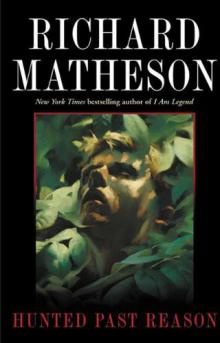 Hunted Past Reason
Hunted Past Reason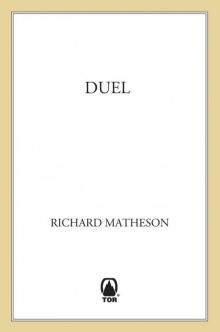 Duel: Terror Stories
Duel: Terror Stories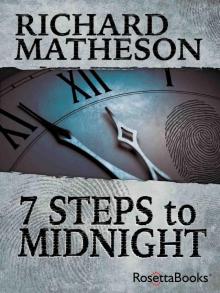 7 Steps to Midnight
7 Steps to Midnight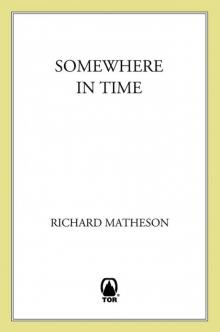 Somewhere in Time
Somewhere in Time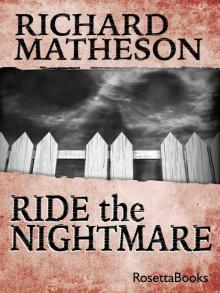 Ride the Nightmare
Ride the Nightmare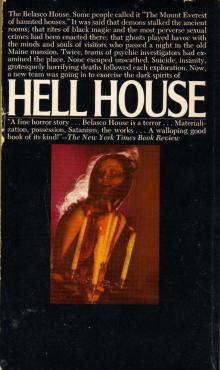 Hell House
Hell House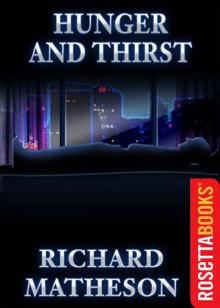 Hunger and Thirst
Hunger and Thirst Lyrics
Lyrics Other Kingdoms
Other Kingdoms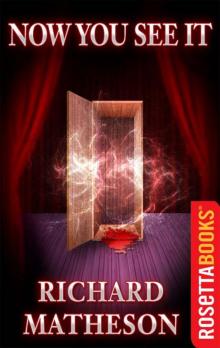 Now You See It . . .
Now You See It . . .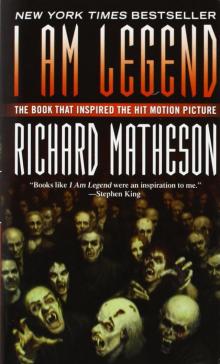 I Am Legend
I Am Legend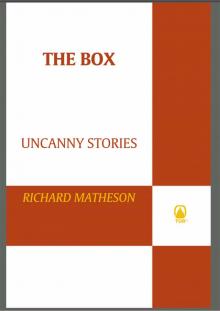 The Box: Uncanny Stories
The Box: Uncanny Stories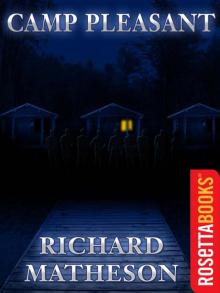 Camp Pleasant
Camp Pleasant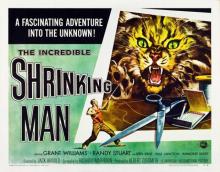 The Incredible Shrinking Man
The Incredible Shrinking Man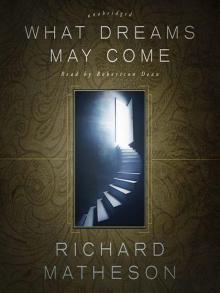 What Dreams May Come
What Dreams May Come The Gun Fight
The Gun Fight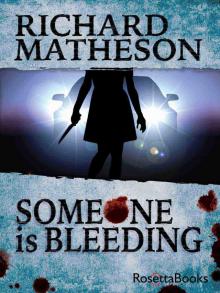 Someone Is Bleeding
Someone Is Bleeding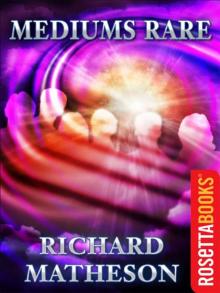 Mediums Rare
Mediums Rare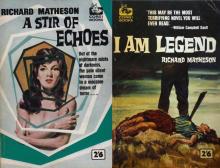 A Stir of Echoes
A Stir of Echoes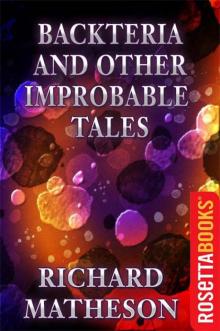 Backteria and Other Improbable Tales
Backteria and Other Improbable Tales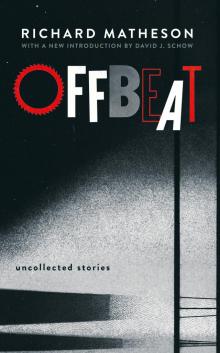 Offbeat: Uncollected Stories
Offbeat: Uncollected Stories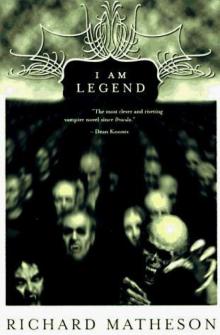 I Am Legend and Other Stories
I Am Legend and Other Stories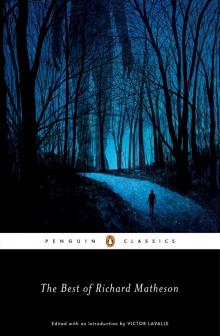 The Best of Richard Matheson
The Best of Richard Matheson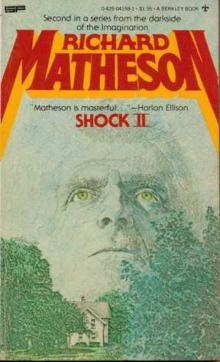 Shock II
Shock II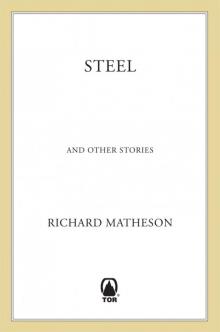 Steel: And Other Stories
Steel: And Other Stories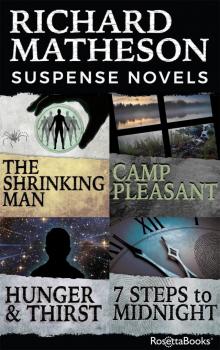 Richard Matheson Suspense Novels
Richard Matheson Suspense Novels The Link
The Link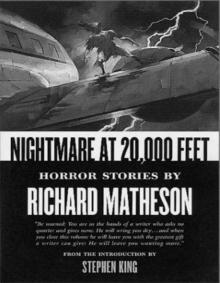 Nightmare At 20,000 Feet
Nightmare At 20,000 Feet Shadow on the Sun
Shadow on the Sun![Steel and other stories [SSC] Read online](http://i1.bookreadfree.com/i/03/21/steel_and_other_stories_ssc_preview.jpg) Steel and other stories [SSC]
Steel and other stories [SSC] Created By
Created By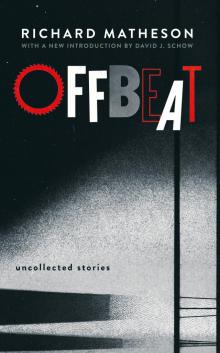 Offbeat
Offbeat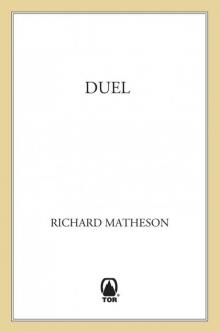 Duel
Duel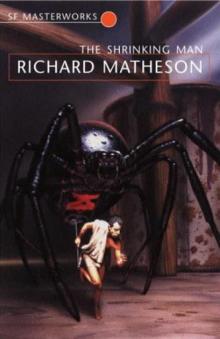 The Shrinking Man
The Shrinking Man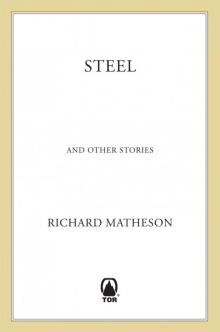 Steel
Steel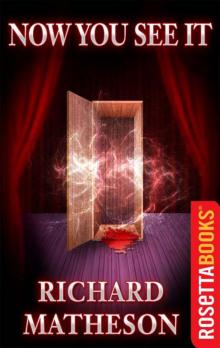 Now You See It
Now You See It